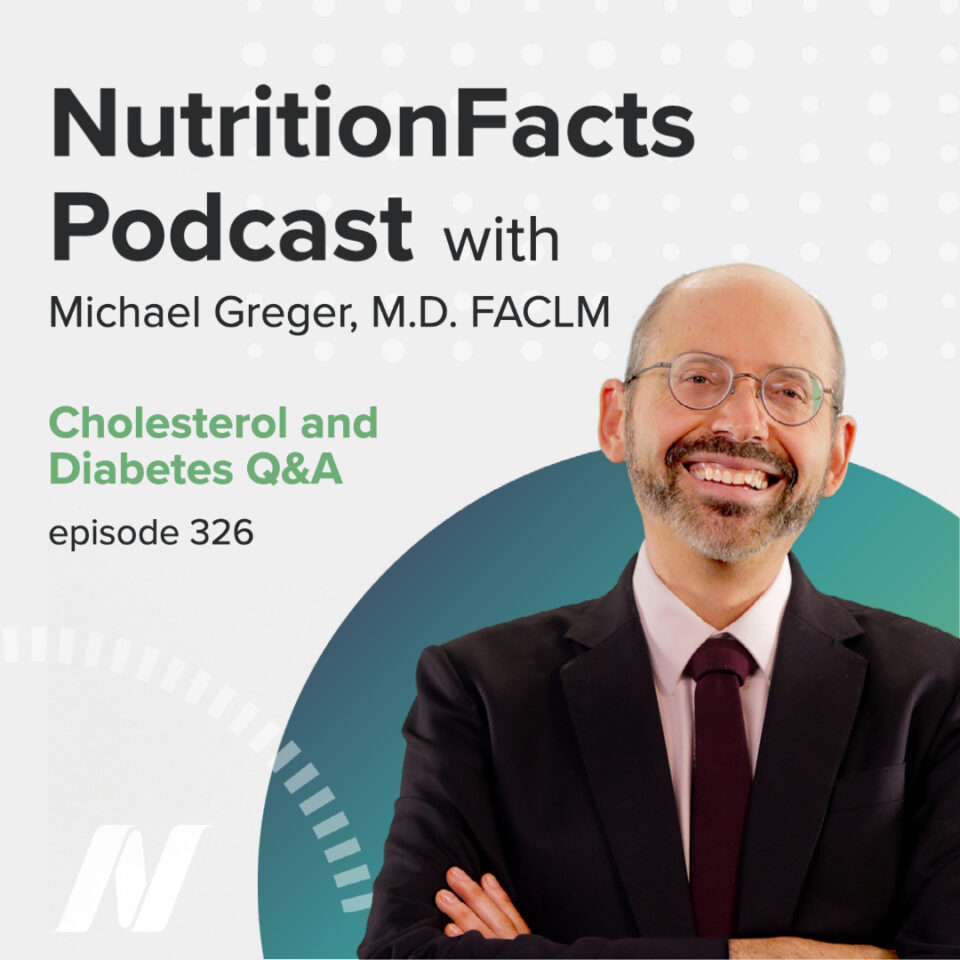Today, I answer common questions like, “What is the ideal LDL?” and “What’s going on when someone eats healthily, but their blood sugars are still out of control?”
Ideal LDL depends on whether or not you have been diagnosed with heart disease. If you have not, a lifetime LDL––well, actually a lifetime LDL under 100 should protect you from heart disease. However, if you didn’t figure this out until middle age, and your LDL’s too high, and you’re trying to get it down to prevent heart disease, then 70 would be the target. If you already have heart disease, then the target––in terms of secondary prevention to prevent a second heart attack––drops down to like 30 to 50, or basically as low as possible. So, wait a second. Could there be a harm of having cholesterol too low?
We didn’t know, until PCSK9 inhibitors came out. We had these new biologic injectable drugs, which can drop people’s cholesterol, LDL cholesterol, into the single digits, and still not seeing any problems with hormone manufacture, like testosterone and estrogen, or any other issues that have piled on. So, only benefit as you go lower and lower, but we don’t––most people should not need drugs to get their LDL down. They just need to cut out or cut down on the three things that increase one’s cholesterol, and that is saturated fat, found mostly in animal fats and junk; trans fats, found almost exclusively now in animal fat, now that it’s been removed from the food supply, from partially hydrogenated oils; and third is dietary cholesterol, found predominantly in eggs, but throughout the animal kingdom.
Just do all that, and your cholesterol should drop right down. Add in a whole bunch of high-fiber plant foods, which is to say whole plant foods, and you can push your cholesterol down even further. Yes, in addition to eating healthy, there are a few foods in particular that
Okay. Jessie has naturally low HDL. With a whole food, plant-based diet, LDL and triglycerides plummeted––Fantastic. But talks about a triglyceride/HDL ratio. What’s an important number to track?
LDL is an important number to track. We used to think HDL, so-called good cholesterol, was good, and actually had benefits in terms of reducing disease risk. It turns out that is not the case, based on a whole range of evidence, including drugs that raise HDL, which actually had to be stopped early because it was killing people. And probably the most important would be the so-called Mendelian randomization studies, where people who are just genetically at birth born with genes that give them kind of unnaturally elevated HDL throughout their entire lives––regardless of what they eat or how they live––do not actually have lower cardiovascular disease.
However, those born with high LDL die early from cardiovascular disease. And those born with low LDL are protected from heart disease, regardless of what they eat, proving that––effectively proving, of course––there’s actually real proving proving in terms of randomized controlled trials, but it’s the best in terms of what you can get for observational data, which…so, the LDL is actually a risk factor, not just a correlate.
So, don’t worry about your HDL. Worry about your LDL. And it’s wonderful that they’re down, and that’s fantastic. Congratulations.
Okay, Francis says, “What is the main reason why one’s A1C fluctuates from [low to high] and high to low? “
Okay. For those of you who are like, what is an A1C? It is a measure of kind of long-term blood sugar control over the last few months or so, but really biased towards kind of more recent events. And so, the main reason is people are eating different foods. Although women can get hormonal changes throughout the month, that even if they’re eating the same thing, they can have different blood sugar responses; so, that could be one reason. And, you know, if you’re sick, you know, you can have really high blood [sugars], even if you’re kind of eating healthy. But typically, we tend to think of HbA1C as––in terms of diabetic control, and how well medications are working. And for pre-diabetes or in general, it’s typically what’s happened with the diet, primarily the glycemic load of different foods. And so, I encourage people to cut out refined grains and things that cause too high of a blood sugar spike.
Okay, Santanu says with a plant-based diet, [I] reduced sugars substantially. I want to know how do I reduce insulin resistance? Great.
But if you wanted to reduce your insulin resistance, you decrease the cause of insulin resistance, which is excess saturated fat intake in the context of a hypercaloric diet. Or excess visceral adiposity. If your waist, measured at your belly button, is more than half your height, you need to lose weight to reduce that visceral fat and decrease insulin resistance, regardless of what you eat.
Okay, BLK says: Type 2 diabetic––oh!––but eating healthy. Wonderful. Not on meds. Fantastic. Oh, but can’t get glucose under control.
And so, one of the reasons may be you’re still––you’re suffering insulin resistance from excess visceral fat. So, if you have excess abdominal fat, it can spill fat in your bloodstream. So, you don’t even have it going into your mouth, but you still have these high levels of fat in your blood, and that interferes with insulin responsiveness in your muscles and liver, and that’s what causes Type 2 diabetes, especially when it offloads fat to your poor pancreas and can destroy some of your insulin-producing cells. And so, weight loss would be the next step. And if your glucose is not under control, you should, indeed, talk to your doctors about being on meds until–– something like metformin––until you can get it under control with diet, though it may take weight loss to drop your visceral fat to levels where your insulin resistance drops enough that you can reverse your diabetes.

 Previous Podcast
Previous Podcast Next Podcast
Next Podcast